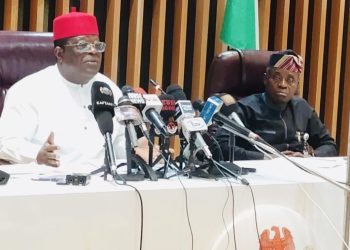By Nkechi Eze
A Bauchi State High Court has dismissed an application seeking a perpetual injunction to restrain the Independent Corrupt Practices and Other Related Offences Commission (ICPC) from investigating financial activities relating to security votes in the Office of the Secretary to the Bauchi State Government.
The case, marked BA/834M/2024, was filed by nine applicants under the name “Concern Indigenes of Bauchi State.” They argued that they had lost confidence in ICPC, the Economic and Financial Crimes Commission (EFCC), and the Nigerian Financial Intelligence Unit (NFIU), accusing the agencies of failing to act on alleged financial infractions by the Bauchi SSG’s office. They prayed the court to bar the anti-graft agencies from handling the matter and transfer responsibility to the Nigeria Police.
In their application, the claimants, represented by counsel Mr. M. J. Jaldi, alleged that the Bauchi SSG’s office had become a “financial drainpipe” against the interest of the people. Jaldi argued that some actions of the Secretary to the State Government, including alleged payments of huge sums in cash without going through financial institutions, violated the Money Laundering (Prohibition) Act and ought to be investigated by the Police.
The ICPC, in its response, filed a counter-affidavit opposing the reliefs sought. Alongside the EFCC, the Commission maintained that the applicants were attempting to use the court as a tool to undermine the statutory mandates of anti-graft agencies. They also noted that the applicants had failed to present any formal complaint or petition to the agencies against the respondents.
Furthermore, ICPC argued that it, EFCC, and NFIU were not the only agencies empowered to investigate corruption cases in Nigeria, stressing that the applicants could approach other agencies, including the Police, without seeking to bar the statutory functions of the anti-corruption bodies.
In his judgment, Honourable Justice F. U. Sarki ruled that the investigative powers of the ICPC, EFCC, and NFIU did not in any way exclude the powers of the Police, which he described as “wider and general.” The judge declared that it was not within the powers of the court to restrain the anti-graft agencies from performing their statutory roles.
“It is not within the powers of this court to restrain the 1st to 3rd Respondents from carrying out their statutory functions. The application is therefore consequently refused,” Justice Sarki held.

















